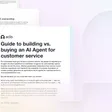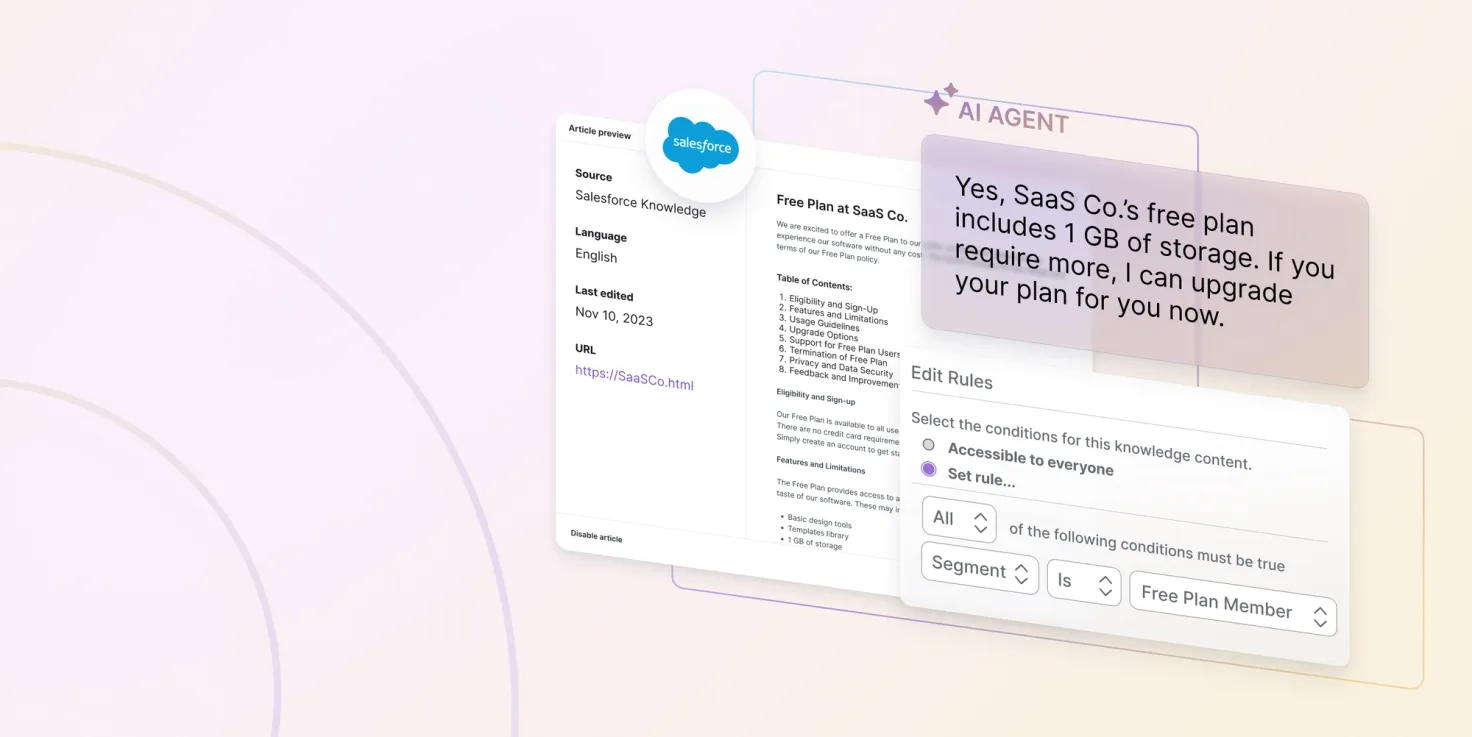
Guide to building vs. buying an AI Agent for customer service
This guide will help you assess the build vs buy question from 5 main angles so you can make a confident, informed decision.
Learn More

As your SaaS company grows, so do your support needs — often at an exponential rate. This is when AI integrations for customer support become crucial.
In periods of high-growth , companies often find their outdated solutions buckling under the increased load, leading to longer response times, inconsistent customer experiences, and overwhelmed support teams.
Luckily, scalability is where AI truly flexes its muscles.
But AI isn’t as simple as flipping a switch. It’s a complex journey filled with potential pitfalls and unexpected challenges. I’ve seen it firsthand — the struggles and triumphs of integrating AI into customer support ecosystems.
In my experience, the real magic happens when AI systems seamlessly integrate with your existing tech stack. Your AI agent needs to be able to do the same tasks as your human agents do. Because, whether you like it or not, even the most advanced AI chatbot or agent is useless if it can’t play nice with your existing systems. In the post, I’ll tell you why.
The integration challenge is one of the biggest hurdles SaaS companies face when implementing AI customer service.
Imagine this scenario. You've just invested in a cutting-edge AI solution, promising to revolutionize your customer support. But there's a problem — it can't access your CRM data, doesn't sync with your product data, and can't seamlessly hand off to your human agents. Suddenly, your AI wonder-tool feels more like a very expensive paperweight, limited to answering simple FAQs.
Integrations are key to ensuring your AI solution doesn’t leave your customers feeling trapped. Connecting AI with your CRM, databases, and every other application your agents use to solve problems ensures that your AI tools are delivering customer service that’s just as capable — but far more efficient — than your human agents.

So what’s the problem? Many SaaS companies struggle to find AI tools that integrate smoothly into their existing infrastructure. Common challenges include:
The solution? Choosing an AI agent with robust, flexible integration capabilities . But more on that later.
Now that we understand the importance of integrations, let’s dive into the five must-have AI integrations for customer support your SaaS company needs, to not only improve your customer service but transform it from a cost center to a growth engine.
Integrating an AI agent with your Customer Relationship Management (CRM) system is like giving it a Ph.D. in "Knowing Your Customers 101." This integration allows your AI to access crucial customer data, including purchase history, support tickets, and preferences.
With a seamless CRM integration, SaaS businesses can actually provide hyper-personalized support. Imagine a customer reaching out about a product issue, and your AI instantly knows their purchase date, previous interactions, and even their favorite features.
80% of customers are more likely to purchase from a company that provides a personalized experience
- Epsilon
Ada's AI Agent , for example, takes this a step further. Our End Users API syncs user data to and from external systems in real-time. This means your AI always has the most up-to-date information, ensuring every interaction is relevant and personalized.
When your AI agent encounters a complex issue it can't resolve, a smooth handoff to human agents is crucial.
Integrating with helpdesk platforms like Zendesk or Freshdesk ensures that all relevant information is transferred seamlessly, preventing customers from having to repeat themselves (which, let's face it, is more annoying than a pop-up ad that won't go away).
Ada's integration with platforms like Zendesk enables effortless transitions between AI and live agents. When a conversation is escalated, support teams have access to the entire conversation transcript, user profile, and key information captured by the AI. It's like giving your human agents X-ray vision into the customer's issue.
Your knowledge base is a treasure trove of information, and integrating it with your AI agent ensures that it always has the latest and greatest answers at its fingertips.
This integration allows the AI to pull relevant articles, FAQs, and troubleshooting guides in real-time, providing customers with accurate and helpful information.

But here’s where it gets really interesting: advanced AI agents like Ada’s don’t just pull information, they learn from it. By continuously analyzing interactions and outcomes, these AI agents can suggest updates to your documentation based on common customer questions, ensuring your knowledge base stays relevant and useful over time.
Integrating your AI chatbot with analytics and reporting tools gives you valuable insights into customer interactions, common issues, and support team performance. Just remember: if you can't measure it, you can't improve it.
We’re not just talking about basic metrics here. Advanced AI integrations can provide deep insights into conversation flows, sentiment analysis, and even potential product improvements based on customer feedback. Integrating data from your AI into business intelligence tools, where it can live alongside data from other sources, means you can analyze how automated interactions are impacting revenue, retention, and other key business metrics.
This level of analytics can transform your support from a reactive service into a proactive driver of business growth.

Integrating your AI customer service across multiple channels ensures a consistent experience, whether customers reach out via web chat, email, social media, or smoke signals (okay, maybe not that last one).
I won’t speak for other solutions, but what I can say is that Ada's AI Agent excels in this area, connecting with various end-user channels including web messaging, phone, email, WhatsApp, Instagram, X (formerly Twitter), SMS, and Facebook Messenger.
This omnichannel approach ensures that your customers receive the same high-quality, personalized support regardless of how they choose to contact you.
AI integrations for customer support are not just a nice-to-have — they're essential for SaaS companies looking to provide exceptional service at scale.
By seamlessly connecting AI with CRM systems, helpdesks, knowledge bases, analytics tools, and multiple communication channels, you can create a support experience that's efficient, personalized, and dare I say, delightful.
The solution lies in choosing an AI platform with robust, flexible integration capabilities. You need seamless connections to various systems through APIs and to ensure that your AI has access to all the data it needs to provide truly personalized, context-aware support.
The right AI agent can do all this and more, handling thousands of simultaneous interactions without breaking a sweat. It ensures consistent support, across multiple channels during periods of hypergrowth.
So, are you ready to take your SaaS customer support to the next level? It's time to embrace the power of integrated AI and watch your customer satisfaction soar faster than a caffeinated software developer on a tight deadline.
Find out how AI agents can unlock better customer experiences and ladder up to your business goals.
Get the guide